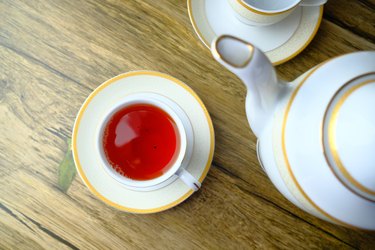
Sipping on tea throughout the day offers a breadth of health benefits, but you would still be wise to take caution — as with anything else in excess, drinking too much tea can have negative effects on your health.
Although tea has about half the caffeine of coffee, too many cups throughout the day still add up. Furthermore, some evidence suggests that tea causes problems for your iron levels and your kidneys. But don't worry: With a little diligence, you will have no problem keeping your tea consumption in check.
Video of the Day
Video of the Day
Benefits of Moderate Consumption
When you brew a cup of tea, you're brewing up several health benefits — and it's not just the benefits of green tea but also those of black tea that you'll want to note. As Harvard Health Publishing explains, both black tea and green tea are made from the same plant; the only difference is that black tea leaves are allowed to oxidize and brown before they are dried whereas green tea leaves are steamed immediately to stop oxidation.
The oxidation process, however, affects more than just the color and taste of the tea leaves. It also lessens the content of chemicals called flavonoids that are found in tea, which explains why there may be more health benefits of green tea than there are of black tea.
The flavonoids in tea — specifically the flavonoids catechins and epicatechins — prevent inflammation and buildup of plaque in your arteries. Because of this, some evidence suggests that tea consumption can reduce your risk of heart attack and stroke.
More evidence is being explored to support the health benefits of tea. A study published in June 2013 in Current Pharmaceutical Design noted that tea is good for preventing disease, maintaining cardiovascular health and even warding off cancer. Studies are ongoing to understand exactly how efficient tea is in this regard.
Disadvantages of Drinking Tea
But even though there are many benefits of green tea and black tea, both of them have their drawbacks when consumed in excess. The first (and maybe most obvious) is overcaffeination.
Yes, tea has less caffeine than coffee. The Food and Drug Administration lists tea as having about 30 to 50 milligrams of caffeine per 8 ounces compared with 80 to 100 milligrams in 8 ounces of coffee. While caffeine is safe when consumed in moderate amounts, drinking too much tea can still lead to excess caffeine.
The FDA discourages people from consuming more than 400 milligrams per day, which would equate to 8 cups of tea, assuming tea is your only source of caffeine. If you have an 8-ounce cup of coffee in the morning, you should consume no more than six 8-ounce cups of tea throughout the day.
If you're drinking too much tea, you run the risk of suffering insomnia, jitters, anxiousness, fast heart rate, upset stomach, nausea, headaches and a feeling of unhappiness from too much caffeine, according to the FDA.
Among the other disadvantages of drinking tea is its effects on blood iron. A case study published in October 2016 in Clinical Case Reports — which highlights a 48-year-old man who had a normal diet but drank excessive tea, thus resulting in low iron — explains how tea has polyphenols that bind to iron and prevent its absorption in the body.
Although it was long believed this happened only to nonheme iron (iron that comes from plant sources), new evidence suggests that heme iron (iron from animal sources) is also affected.
One of the final disadvantages of drinking tea in excess, as pointed out by Harvard Health Publishing, is that black tea is a source of oxalates, which could cause kidney stones.
In general, the advantages of tea outweigh the disadvantages as long as you keep your tea consumption to a moderate amount. Aim for one or two servings a day, which can serve as a nice pick-me-up and offer you plenty of flavonoids without too much caffeine, too many oxalates or any extreme effect on your iron absorption.
- Food and Drug Administration: “How Much Caffeine is Too Much?”
- Clinical Case Reports: “Iron Deficiency Anemia Due to Excessive Green Tea Drinking”
- Current Pharmaceutical Design: “Tea and Health: Studies in Humans”
- Harvard Health Publishing: “Flavonoids: The Secret to Health Benefits of Drinking Black and Green Tea”
Was this article helpful?
150 Characters Max
0/150
Thank you for sharing!
Thank you for your feedback!